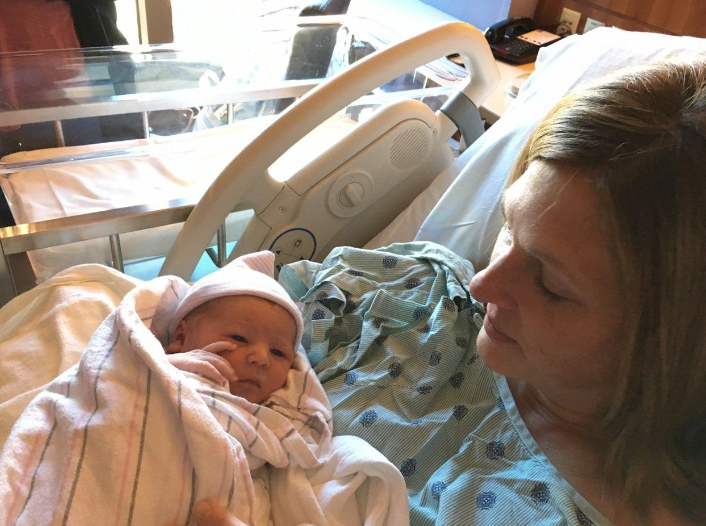Hendricks County Woman Makes Full Recovery After Medical Scare
Writer / Heather Chastain
Photography provided by Guingrich Family
A Hendricks County woman nearly died after an artery in her heart ruptured 10 days after giving birth to a healthy baby boy.
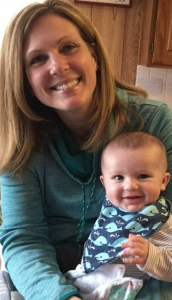 Stephanie Guingrich, 40, is a mother of three. She has a 12-year-old step-daughter, a 4-year-old daughter and a baby boy named Ryan born November 9, 2017. With no known health issues, learning she has suffered a coronary artery dissection, the result of spontaneous tearing in the coronary artery wall of the heart, less than two weeks after giving birth was a shock.
Stephanie Guingrich, 40, is a mother of three. She has a 12-year-old step-daughter, a 4-year-old daughter and a baby boy named Ryan born November 9, 2017. With no known health issues, learning she has suffered a coronary artery dissection, the result of spontaneous tearing in the coronary artery wall of the heart, less than two weeks after giving birth was a shock.
“I’ve always been healthy, no medical conditions. I’d never been the E.R. before,” Stephanie says. “I had an easy pregnancy and a successful c-section, but shortly after I came home, I started to feel chest pain.”
Her husband, Adam, filled in most of the details because Stephanie’s memory is still fuzzy about the incident several months later.
“The problem started 3-4 days after she got home from the hospital,” Adam says. “One day I had this pain in my chest and I called the doctor. When the nurse called back, she said the doctor said to go to the emergency room,” she says.
Certain it was just anxiety over her new baby, she ignored the pain. Then Sunday morning November 19, 2017, she realized she was in trouble.
“Stephanie was downstairs with the kids, nursing Ryan. She told me she had leaned over a little to adjust the baby and heard a pop in her back and then began feeling horrible chest pain,” Adam says.
Her 4-year-old daughter started yelling upstairs, “Daddy! Daddy! Mommy needs you,” Adam says. “Then I hear Stephanie yell, ‘Adam, I need you!’ I could tell her in her voice something was really wrong.”
When Adam came downstairs he said she was white and sweating profusely. He thought she was having an anxiety attack. He says Stephanie is always concerned about nursing and making sure their son was getting enough milk. The baby had lost some weight after they brought him home from the hospital, so milk production and his consumption had made her anxious for several days.
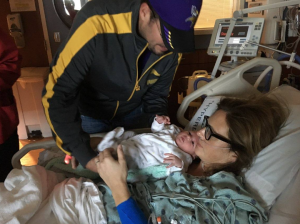 “I got her a washcloth and some water and told her to calm down and take some deep breaths and then she said, ‘I think you need to call 911.’”
“I got her a washcloth and some water and told her to calm down and take some deep breaths and then she said, ‘I think you need to call 911.’”
Adam called his parents, who live down the street, to come stay with the kids. During the drive to the hospital, Adam continued to talk to Stephanie and ask her what was wrong and what she was feeling.
“I just kept saying ‘Hang on hon, I’ll get you there,” he says. Then a moment later, Stephanie said, ‘I think I’m going to pass out.’”
Adam says she stopped breathing, her eyes rolled back in her head, arms went stiff and he heard her make a gurgling sound.
“In 1997, I witnessed by younger brother pass away from cancer. He made that same gurgling sound right before he passed,” Adam says. Then he said she turned an unusual color of yellow gray. “Instantly I knew she was dead, and I had less than 5 minutes to save her. I knew I needed to get her oxygen and to get her heart going again to preserve her brain function.”
Adam raced to the Avon-Washington Township Fire Department and started banging on the garage doors until he got someone’s attention. It took 5 guys to pull her out of the passenger seat, onto a stretcher and into the ambulance.
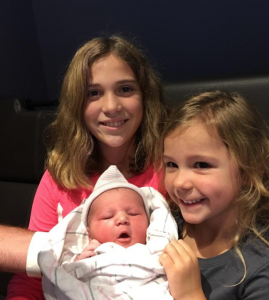 “The fire fighters said I couldn’t ride with them because they needed ‘to work on her.’ That’s what they said. They were vague. I knew that meant they were going to have to shock her,” he says.
“The fire fighters said I couldn’t ride with them because they needed ‘to work on her.’ That’s what they said. They were vague. I knew that meant they were going to have to shock her,” he says.
At IU West, a firefighter told Adam, ‘we brought her back [to life],” he recalled. “And all the doctors would tell me is ‘she’s really sick. That’s when I realized this was not good at all. I started to realize Stephanie may not make it back home with me.”
Still unsure exactly what had happened, doctors told Adam they thought she either had a brain aneurism, a heart attack or a clogged artery. At this point Stephanie is on life support in a medically induced coma, tied to the bed as they typically do in these cases. Doctors told Adam she would remain this way for several days while the heart healed. Her ejection fraction, or EF, was at 24. A normal heart is at 60. Doctors said she needed to get hers to at least 50 or she would have to have a pace maker or a defibrillator.
“I was so sad. So emotional. I was a mess. I started having flashbacks to when my brother was fighting cancer. With that many tubes coming out of her, I just knew she wasn’t going to make it,” Adam says. “All I could think about was how I was going to tell the kids their mom wasn’t coming home and how I was going to raise three kids alone. It was horrible. I was feeling the highest of highs just days before. I had a son and I was able to pay tribute to my brother by naming the baby after him. Now I was at the lowest of lows.”
Finally, seven hours later, doctors allowed Adam to see her. “She looked terrible. Machines were breathing for her and they warned me she would be ice cold. Doctors also warned me if she comes out of this coma, she would have amnesia,” he says.
Adam sat by her bedside in a state of constant prayer. Early the next morning, he had dozed off and awoke to nurses frantic around Stephanie.
“She had managed to lean up while restrained and pulled the breathing tube out of her mouth and was breathing completely on her own. She was expected to stay in the coma for days and less than 12 hours later she was alert and breathing,” Adam recalls.
Just as the doctors had warned, Stephanie had amnesia.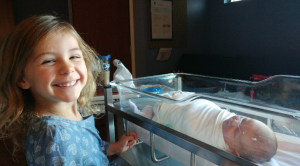
“She remembered me and the kids, but she thought she was still in the hospital because she had just had the baby. She didn’t know the date or other facts. She just kept asking for the baby. She said she wanted the baby and she wanted to nurse him,” Adam says. “I remember saying, ‘I can’t stay here, I’ve got to go,’” Stephanie says.
After a five- day stay in the hospital, Stephanie came come home with a life alert vest and still no diagnosis about what happened to her. This vest was designed to monitor her heard function and shock her if necessary. Fortunately, she never had to be shocked. It took a couple of weeks to get her memory back. Short term memory was still a problem.
One month after coming home from the hospital, she went to Methodist Hospital for an MRI. It was then doctors finally diagnosed her with a coronary artery dissection, the result of spontaneous tearing in the coronary artery wall of the heart. Doctors said the stress of the pregnancy on a then 39-year-old woman was the cause.
“I was still in denial about what happened. Once I came home, I really didn’t feel that bad,” Stephanie says.
Fortunately, her EF went up to 59 and she didn’t need a pace maker or defibrillator. It needed to be above 50.
“I was so happy and the doctors were shocked because most people don’t have a complete recovery,” she says.
“She’s a fighter,” Adam’s mom said with a grateful smile on her face.
She’s still under a doctor’s care, but Stephanie continues to remain healthy and happy with her family.


